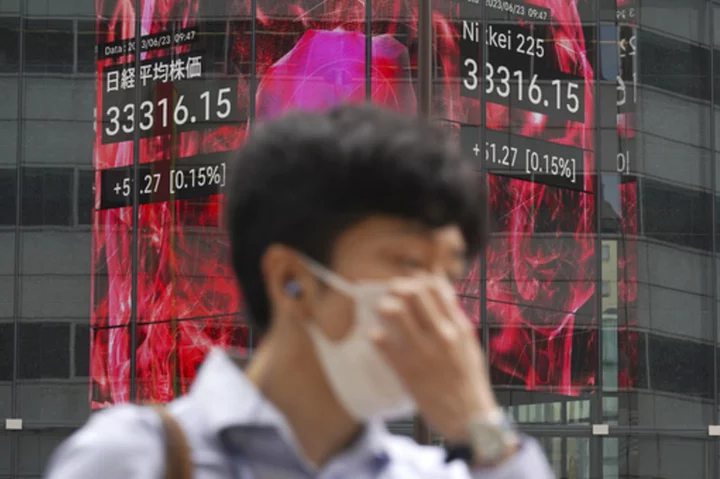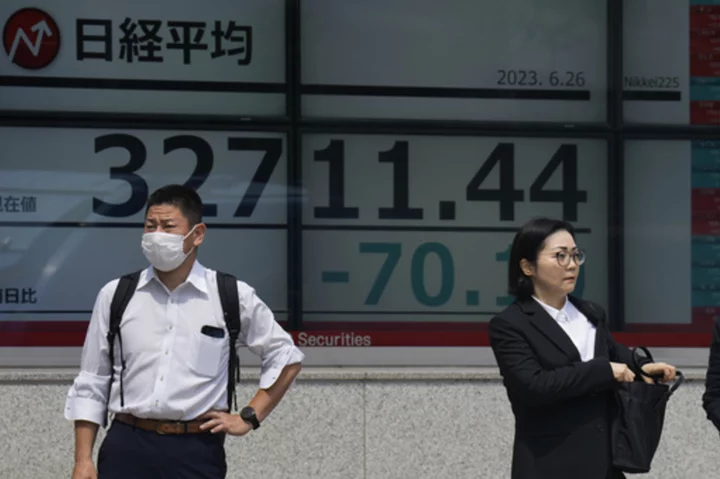BANGKOK (AP) — Asian shares sank sharply Friday after several central banks around the world cranked interest rates higher in their fight against inflation.
Hong Kong and Tokyo shed nearly 2% and most other regional markets declined. U.S. futures and oil prices also were lower.
Japan reported its inflation rate was higher than expected, adding to expectations the central bank might adjust its policies to reflect upward price pressures, which have pushed the dollar's value against the yen sharply higher. The Bank of Japan has kept its benchmark interest rate at minus 0.1% for a decade as policymakers keep credit cheap to encourage more investment and spending.
The core inflation rate, excluding volatile energy and food prices, was 3.2% in May, above the official 2% target for a 14th straight month, the government reported.
“We think there are signs of inflationary pressure building up on the supply side, but it is certainly not strong enough for the BOJ to bring about immediate tightening,” ING Economics said in a commentary.
The dollar was trading at 143.34 yen, up from 143.10 yen and near its highest level since November. A weaker Japanese yen raises costs for Japanese businesses and consumers given the country's heavy reliance on imports.
Tokyo's Nikkei 225 lost 1.5% to 32,781.54 and the Hang Seng in Hong Kong fell 1.8% to 18,883.80.
In Seoul, the Kospi fell 0.9% to 2,570.10, while Australia's S&P/ASX 200 gave up 1.3% to 7,009.20. Markets in mainland China were closed for a holiday. Shares also fell in Mumbai and Bangkok.
On Thursday, the S&P 500 rose 0.4% to 4,381.89, even though the majority of stocks fell. A rebound for technology stocks helped to overshadow losses elsewhere in the market and keep the benchmark index afloat.
Gains for high-growth stocks also drove the Nasdaq composite to a market-leading gain of 1%, to 13,630.61. The Dow Jones Industrial Average fell less than 0.1% to 33,946.71.
The Bank of England hiked its main interest rate by a bigger margin than expected to a 15-year high. Central banks in Norway, Switzerland and Turkey also raised borrowing rates.
Stock indexes in Europe fell following the most recent rate increases. Britain’s FTSE 100 slipped 0.8%. The latest interest rate increase from the Bank of England marked its 13th hike in a row in its effort to combat stubbornly high inflation.
In the United States, meanwhile, Federal Reserve Chair Jerome Powell reiterated his belief that inflation is still too high and that further increases to rates may be necessary. Powell testified before a Senate committee Thursday, a day after appearing before a House of Representatives committee.
The Fed held interest rates steady at its last meeting after raising rates aggressively throughout 2022 and into 2023 to tame painfully high inflation. Inflation has cooled somewhat since last summer, but the Fed has signaled it may raise rates two more times this year as it tries to push inflation down to its stated goal of 2%.
Central banks worldwide have been raising interest rates to make borrowing more costly and slow economic growth to stifle inflation. But the strategy risks going too far in stalling growth and dragging economies into a recession.
In Asia, central banks have begun to keep interest rates steady, or in the case of Vietnam, cut them, as their economies have slowed.
High interest rates have already slowed manufacturing and other parts of the U.S. economy. They've also helped cause three high-profile failures in the U.S. banking system. The banking industry remains under pressure, even after the federal government acted quickly to provide support.
The Labor Department reported Thursday that the number of Americans applying for unemployment benefits remained elevated last week, a possible sign that the Fed’s rate hikes are beginning to cool a surprisingly resilient labor market.
In the housing industry, sales of previously occupied homes strengthened last month to top economists’ expectations for a slide.
In other trading Friday, U.S. benchmark crude oil shed 59 cents to $68.92 per barrel in electronic trading on the New York Mercantile Exchange. It gave up $3.02 to $69.51 on Thursday.
Brent crude, the international standard, lost 53 cents to $73.82 per barrel.
The euro was trading at $1.0924, down from $1.0960.
___
AP Business Writer Damian J. Troise contributed.









